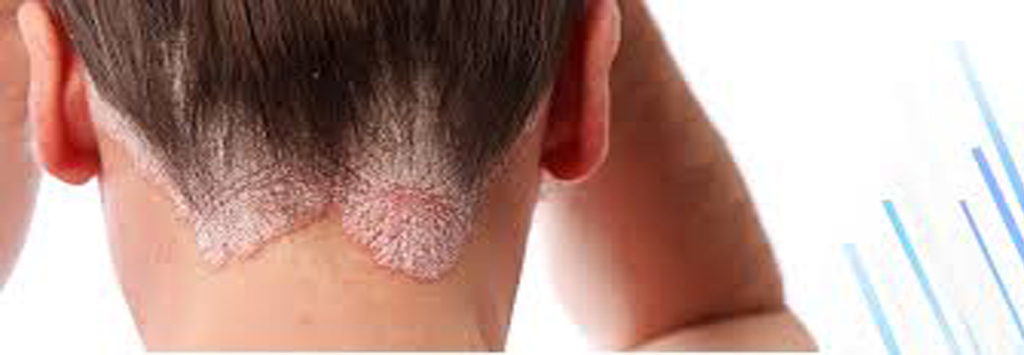
What is Psoriasis?
Psoriasis is a chronic autoimmune condition caused by an overactive immune system that forms scales and itchy, dry patches. It is typically red colour but on people with darker skin tone, it may be purple in colour. It varies in severity ranging from small patches to complete body coverage. This condition of the skin affects 2-3 percent of the population, which is seen in both sexes and can occur at any age mostly seen in adults.
Types
- Plaque psoriasis – This is the most common type of psoriasis which appears as raised red areas covered by white or silvery skin. These are called plaques which are commonly found on elbow, knees, scalp and back.
- Guttate psoriasis – Small numerous drop-shaped red or pink scaly lesions which appear over large areas of the body especially trunk, limbs and scalp.
- Inverse Psoriasis – Appears as smooth inflamed or reddened patches of the skin frequently affects skin folds particularly armpits, under the breast, genitals, between buttocks.
- Pustular Psoriasis – These are blisters filled with non-infectious pus surrounded by red areas which are usually tender. This can be seen on hands and feet or all over the body.
- Erythrodermic Psoriasis – Widespread inflammation and scaling of skin associated with severe itching, swelling and pain.
Causes
- Irritants
- Allergens
- Microbes
- Hot and cold temperatures
- Foods
- Stress
- Hormones
Symptoms
- Rashes
- Dry skin
- Soreness
- Itching
- Burning sensation around patches
- Swollen joints
Complications
People affected by psoriasis have 27 percent increased risk of developing diabetes. Individuals with psoriasis or psoriatic arthritis may also have a slightly higher risk of heart attacks. Around 5 to 10 percent with Psoriasis have risk of developing irritable bowel disease (crohn’s disease and ulcerative colitis). And Psoriatic arthritis is also a common complication in severe Psoriasis.
Psoriatic Arthritis is a chronic inflammatory arthritis where joint becomes swollen, tender and painful. This can occur in any joint, but mostly can affects finger and toe joints. Psoriatic arthritis is generally associated with skin and nail Psoriasis. Psoriasis can affect nails and produce pin head sized depression with discoloration under the nails. In more severe cases nails become thick and separate from the underlying nail bed.
Homeopathy Treatment
Psoriasis is not just a disease of the skin. It is caused many times due to imbalances in the immune system local applications and ointments will not be helpful to control psoriasis. Homeopathy treatment believes in the holistic and natural concept. And constitutional homeopathy approach is followed and based on the constitution, emotional factors, disposition, and factors worsening the symptoms are considered before prescribing a remedy. Psoriasis treatment at not only aims at relieving the symptoms but treats the root cause to control psoriasis. People’s feedback suggests that homeopathy remedy is highly effective in the treatment of psoriasis without any side effects and people are highly satisfied with homeopathy treatment for psoriasis. Furthermore, expert homoeopath at only provide constitutional homeopathy treatment for psoriasis after detailed analysis of patients physical and psychological aspects but also take care of the overall health of the individual.
Skin Care
- To protect your skin avoid Skincare products that irritate your skin. Scratching, picking your skin and skin injuries such as cuts, scrapes, cold and dry climate. Cold weather worsens the symptom.
- The most important thing which you can do is keep your skin moist. Use moisturizing creams, lotions. Use plain petroleum jelly without any cosmetic products.
- Aloe vera has soothing properties and is the most promising agent, which is safe and natural to apply to skin with psoriasis lesions.
Monday to Saturday:
09.30am to 02.00pm
05.30pm to 09.30pm
Sunday:
09.30am to 02.00pm

